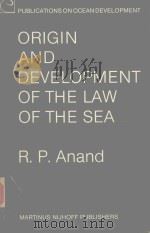《INTERNATIONAL LAW AND DEVELOPMENT》
| 作者 | 编者 |
|---|---|
| 出版 | MARTINUS NIJHOFF PUBLISHERS |
| 参考页数 | 457 |
| 出版时间 | 1988(求助前请核对) 目录预览 |
| ISBN号 | 9024737184 — 求助条款 |
| PDF编号 | 812894258(仅供预览,未存储实际文件) |
| 求助格式 | 扫描PDF(若分多册发行,每次仅能受理1册) |
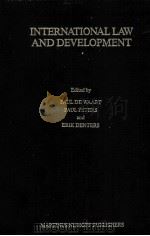
PART 1-GENERAL1
1.1Sustainable development as a principle of international law Nagendra Singh1
1 Declaration on the right to development1
2 The concept of sustainable development3
3 New imperatives for co-operation among nations and international law3
4The imperative of sustainability in relation to the right to development5
4.1 Legal principles,rights and responsibilities for sustainable development5
4.2 The concept of extraterritorial areas as international commons and their identification8
4.3 The adequacy and potency of the law in the field10
5 The value of the law without sanctions; the problem of potency and enforceability11
1.2International law:instrument or impediment of change and development? Kamal Hos sain13
1 Need for change13
2 NIEO:demands of the 'Trade union of the poor'16
3 Towards a legal framework for global growth18
1.3Co-operation in social research:alternatives in development J.George Waardenburg21
1 Introduction21
2 Some general reflections21
3 A brief history of the programme25
4 Some evaluative reflections on the IDPAD experience27
PART 2-ECONOMIC SOVEREIGNTY31
2.1The right of a State to choose its social and economic system:some reflections on the interface of international and national legal orders Ramatullah Khan31
1 Preference for pragmatism31
2 Concern over the Seoul Declaration32
3 Rise and fall of permanent sovereignty33
2.2The interaction between national law and international law in Indonesia Sunaryati Hariono35
1 Introduction35
2 The role of the Bandung Conference36
3 Comparison with CERDS and Seoul Declaration37
4 Indonesian law and NIEO principles40
5 Effect of foreign aid and foreign investment on the legal developments in Indonesia41
6 The effect of national law on international law42
7 Conclusions43
2.3Towards a theoretical and sociological framework for a study of the right to economic self-determination of peoples Anthony Carty45
1 Conceptual apparatus of international law45
2 Nationalism and cohesion in complex developing societies; the Mexican State:economic crisis and cultural fragmentation48
3A sociology of the law49
3.1 Attempts to control foreign investment49
3.2 The external debt50
3.3 The trade negotiations:GATT and the US51
4Towards a pathology of Mexican political culture52
4.1 Some comtemporary debates52
4.2 An historical perspective53
4.3 The present crisis,democratization and the theory of the State54
2.4Permanent sovereignty over natural resources:substratum of the Seoul declaration Subrata Roy Chowdhury59
1 The Philosophy of the Seoul Declaration59
2Principle of permanent sovereignty61
2.1 Genesis of the modern concept61
2.2 Sovereignty:the concept of inalienability62
2.3 Right to regulate foreign investments64
2.4 Promotion of foreign investments:recent trends64
2.5 Code of Conduct67
2.6 Restrictive business practices v.transfer of technology68
2.7 Pacta sunt servanda69
2.8 Stabilization v.renegotiation:recent trends in State practice71
2.9 Right to nationalize73
2.10 Public purpose75
2.11 Non-discrimination75
2.12 Appropriate compensation76
3 The principle of peaceful settlementof disputes78
4Conclusions80
4.1 Permanent sovereignty over natural resources;general principles80
4.2 Corollary rights81
4.3 Principle of peaceful settlement of disputes83
4.4 Principle of good faith83
2.5Permanent sovereignty over natural resources versus the common heritage of mankind:complementary or contradictory principles of international economic law?Nico J.Schrijver87
1 Introduction87
2The principle of permanent sovereignty over natural resources87
2.1 Legal evolution87
2.2 Scope89
2.3 Objectives90
2.4 Right of States derived from the principle of PSNR90
2.5 Legal status91
3The principle of the common heritage of mankind93
3.1 The background:the decline of the freedom of the high seas93
3.2 Legal evolution95
3.3 Scope of the principle of the Common Heritage of Mankind96
3.4 Objectives and implications arising from the principle of the Common Heritage of Mankind96
3.5 Legal status98
4 Conclusions99
PART 3-INVESTMENT105
3.1Transnational corporations and emerging international legal standards Sylvanus Tiewul105
1 The transnational corporation phenomenon105
2 Concerns over transnational corporations107
3 Efforts at promulgating international legal standards110
4Generally accepted international legal standards113
4.1 Standards of conduct113
4.2 Principles relating to the treatment of transnational corporations115
3.2Science and technology for development:individual property and public interest D.Kokkini Iatridou and P.J.I.M.de Waart119
1 Individual initiative,property and development119
2 The right of every State to benefit from science and technology121
3Legal research into science and technology for development122
3.1 Terminology123
3.2 National regulations123
3.3 International regulations124
3.4 Fiscal aspects125
3.5 Dispute settlement125
4 Final remarks128
3.3Investment risk and trust:the role of international law Paul Peters131
1 Introduction131
2 Background data132
3 Scope of this paper132
4 Justification133
5 The negative factors135
6 The flow of direct investment136
7 Recent investment treaties137
8 Some statistics138
9 Preambles and the objectives set out therein139
10 Outline of substantive provisions of investment treaties140
11 Expropriation142
12 The standard of compensation144
13 Losses due to war or revolution146
14 Invocation of international law146
15 Arbitration147
16 Promotion of investments149
17 Miscellaneous provisions149
18 MIGA150
19 The respective merits of investment insurance and treaty protection152
20 Significance of investment treaties as evidence or as source of customary law153
21 Conclusions154
3.4Bilateral investment promotion and protection agreements:practice of the People's Republic of China Li Shishi163
1 Introductory remarks163
2Background164
2.1 Necessity and possibility164
2.2Basic considerations165
2.2.1 Equality and mutual benefit166
2.2.2 Sovereignty and nationaljurisdiction166
2.2.3 National treatment and most-favourednation treatment (MFN)167
3Features of the Chinese BIAs with developed countries167
3.1 Coverage167
3.2 Treatment169
3.3 Repatriation171
3.4 Subrogation172
3.5 Expropriation173
3.6Settlement of disputes174
3.6.1 Dispute category No.Ⅰ175
3.6.2 Dispute category No.Ⅱ175
3.6.3 Dispute category No.Ⅲ176
4Special features of Chinese BIAs with developing countries and other socialist countries177
4.1Chinese BIAs with developing countries177
4.1.1 Encouragement and promotion177
4.1.2 State sovereignty and nationaljurisdiction178
4.1.3 Flexibility179
4.2 China-Romania Agreement180
5 Final observations180
PART 4-TRADE187
4.1The concept of coercion:a wrong in itself Detlev Chr.Dicke187
1 A symptom of bad nerves187
2 A history of failures189
3 Towards a prohibition of economic coercion190
4.2Impact of development needs on international trade regulation Ewa Butkiewicz193
1 Introduction193
2 GATT194
3 Legal character of trade preferences197
4 A return to the original GATT system199
4.3Economic and social rights:minimum standards in relation to a New International Economic Order Musheer Ahmed Pesh Imam203
1 Introduction203
2 Trade barriers204
3 Minimum standard for trade targets in an international development strategy208
4.4Countertrade and the Third World Roeland F.Bertrams213
1 Introduction213
2 General213
3Types of countertrade214
3.1 Industrial compensation214
3.2 Buy-back arrangements215
3.3 Clearing agreements,switches216
3.4 Barter217
3.5 Countertrade217
4 Motivations218
5 Attitudes219
6 Disadvantages220
7 The future221
PART 5-FINANCE AND TAXATION229
5.1Some notes on IMF conditionality with a human face J.Verloren van Themaat229
1 Introduction229
2 The basis for conditionality229
3 Effectof conditionality on human rights230
4 Structural balance-of-payment problems232
5 IMF instruments in reaching social objectives233
6 Sovereignty233
5.2IMF conditionality:economic,social and cultural rights,and the evolving principle of solidarity Erik M.G.Denters235
1 Introduction235
2 IMF assistance and conditionality236
3Economic,social and cultural rights237
3.1 The International Covenant on Economic,Social and Cultural Rights:scope of obligations238
3.2 Promotion of individual economic rights239
3.3 Observance of ICESCR by the IMF239
4Solidarity:conditionality for surplus States241
4.1 Symmetrical adjustment as a legal principle242
5 Proposals for legal research243
5.3The changing structure of financial resources in regional development banks Marc Cogen247
1 Introduction247
2 The establishment of concessional funds and the principle of separation of financial resources248
3 Can private investors become shareholders in future?250
4 Recommendation for future research252
5.4Debt internationalization and other propositions on external debts Mario Feldman255
1 Introduction255
2 Debt adjustment255
3 Financing by private banks256
4Transfer of the debts to international financing institutions258
4.1 Advantages and disadvantages of the debt transfer258
4.2 Relation between debt transfer to international institutions and other proposals259
5 Conclusions260
5.5Taxation and economic development M.P.van Ouerbeeke and J.C.Prast-Ragetli261
1 Introduction261
2Double taxation and its avoidance262
2.1 Exemption method263
2.2 Credit method263
2.3 Application of the method264
3Incentives granted by developed countries to stimulate investment in developing countries264
3.1 National legislation264
3.2 Tax treaties265
3.3 Tax sparing credit265
3.4 Additional tax sparing credit266
4Model tax treaties266
4.1 United Nations266
4.2 OECD267
5 Developing countries and tax treaties267
6 Taxation of royalties; transfer pricing268
7 The effects of tax treaties268
8 International organizations269
9 Conclusions269
PART 6-ECONOMIC,SOCIAL AND CULTURAL RIGHTS275
6.1The significance of the Limburg principles E.V.O.Dankwa and C.Flinterman275
1 Introduction275
2 The relationship between economic development and promotion of human rights276
3 Limburg Principles277
4 Resolution of apparent contradictions277
5 Interpreting ambiguous phrases and terms278
6 Guidance for State parties,the Committee and the international community279
7 Conclusion280
6.2The legal dimension of socio-cultural effects of private foreign enterprise:the Lome-Ill convention Cecilia Andersen-Speekenbrink283
1 Introduction283
2 The socio-cultural dimension in the development process283
3 The role of private foreign enterprise in financial flows to developing countries and in particular the ACP States286
4 The economic effects of private foreign investment for host States289
5 The socio-cultural effects of private foreign enterprise290
6 The potential of the Lome-Ill Convention292
7 Conclusion294
6.3The role of the development concept in the UN Declaration on the right to development and in the UN Covenant B.G.Ramcharan295
1 Introduction295
2 UN Declaration on the right to development296
3 ICESCR298
4Committee on Economic,Social and Cultural Rights299
4.1 Economic,social and cultural rights as legal rights300
4.2 Legal obligations in the face of underdevelopment301
4.3 The principle of equality301
4.4 Assuring the means of subsistence to all:bench marks of minimum standards302
5 Conclusions302
6.4Minimum international labour standards:the right to freely chosen work and the prohibition of forced labour Jantine Fopma305
1 Introduction305
2Minimum international labour standards306
2.1 Meaning of the term306
2.2Proposals to include labour standards in trade agreements307
2.2.1 ILO307
2.2.2 EEC309
2.2.3 International Trade Unions309
2.2.4 Canada,US,Netherlands310
3 Priority among ILO Conventions as implied by ILO itself311
4 Conclusions312
6.5Supervision with respect to the right to food and the role of the World Bank G.J.H.van Hoofand B.G.Tahzib317
1 Introduction317
2Legal status of the right to food318
2.1 Introduction318
2.2 The content of legal obligations concerning the right to food319
2.3 The legal character of economic,social and cultural rights321
3Supervision with respect to the right to food325
3.1 Brief outline of the supervisory mechanism contained in the International Covenant on Social,Economic and Cultural Rights325
3.2Main factors influencing the effectiveness of supervision326
3.2.1 The composition of the supervisory organ326
3.2.2 The regularity of supervision327
3.2.3 The secretarial services at the disposal of the supervisory organ327
4The role of the World Bank329
4.1 Brief survey of the World Bank's policies towards questions concerning food329
4.2 The World Bank's position with respect to world food problems330
4.3 Supervision within the World Bank332
5 The feasibility of closer co-operation between the World Bank and the Committee on Economic,Social and Cultural Rights333
PART 7-RIGHT TO DEVELOPMENT341
7.1Participation of development countries in decision-making processes Danilo Turk341
1 Introduction341
2 Economic reality and international law342
3The question of participation of developing countries in certain international organizations345
3.1 GATT345
3.2 IMF347
4 The concept of voting parity between developed and developing countries in international economic organizations350
5 Participation of developing countries in decision-making processes and human rights351
6 Conclusions353
7.2Principles of international development law:the right to development as an inalienable human right Milan Bulajic359
1 Introduction359
2 Compromise without consensus:lack of wisdom360
3 Reference to international law:a critical appraisal363
4 Towards a principle of international development law366
7.3State rights and human rights as two sides of one principle of international law:the right to development Paul J.I.M.de Waart371
1 The right to development as a NDEO principle371
2 Alleviating absolute poverty as a legal research challenge373
3 Legal aspects penetrating international development strategy375
7.4The UN Declaration on the right to development in the light of its travaux preparatoires Maria Magdalena Kenig-Witkowska381
1 Introduction381
2 Subjective delimitation381
3 Scope ratione materiae383
4 Implementation385
5 Concluding remarks386
Summary of discussions389
Participants in the seminar on International Law and Development401
Research programme404
Annexes409
1Declaration on the progressive development of public international law relating to a new international economic order (Seoul declaration adopted at the 62nd ILA conference,1986)409
2 Declaration on the right to development (UN General Assembly res.41/128,1986)419
3 The Limburg principles on the implementation of the International Covenant on Economic,Social and Cultural Rights (1986)425
List of references439
Index453
1988《INTERNATIONAL LAW AND DEVELOPMENT》由于是年代较久的资料都绝版了,几乎不可能购买到实物。如果大家为了学习确实需要,可向博主求助其电子版PDF文件(由 1988 MARTINUS NIJHOFF PUBLISHERS 出版的版本) 。对合法合规的求助,我会当即受理并将下载地址发送给你。
高度相关资料
-
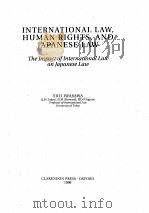
- INTERNATIONAL LAW,HUMAN RIGHTS,AND JAPANESE LAW
- 1998 CLARENDON PRESS·OXFORD
-
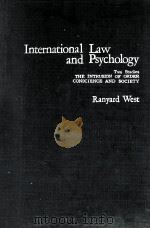
- INTERNATIONAL LAW AND PAYCHOLOGY
- 1974 OCEANA PUBLICATIONS INC
-

- THE POLAR REGIONS AND THE DEVELOPMENT OF INTERNATIONAL LAW
- 1996 CAMBRIDGE UNIVERSITY PRESS
-

- ASIAN STATES AND THE DEVELOPMENT OF UNIVERSAL INTERNATIONAL LAW
- 1972 VIKAS PUBLICATIONS
-

- INTERNATIONAL LAW AND ORDER
- 1971 STEVENS & SONS
-

- THE DEVELOPMENT OF INTERNATIONAL LAW BY THE INTERNATIONAL COURT
- 1958 STEVENS & SONS LIMITED
-

- Biodiversity and International Law
- 1992 IOS PRESS
-

- TERRORISM AND INTERNATIONAL LAW
- 1984 PROGERSS PUBLISHERS MOSCOW
-
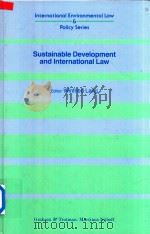
- Sustainable Development and International law
- 1995 Graham & Trotman Martinus Nijhoff
-

- International Law and United States Law
- 1999 Ashgate Dartmouth
-
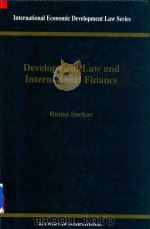
- Development Law and International Finance
- 1999 Kluwer Law International
-

- Korea and International Law
- 1993 Korea University
-

- Land-Based Marine Pollution International law Development
- 1987 Graham & Trotman/Martinus Nijhoff
提示:百度云已更名为百度网盘(百度盘),天翼云盘、微盘下载地址……暂未提供。➥ PDF文字可复制化或转WORD

